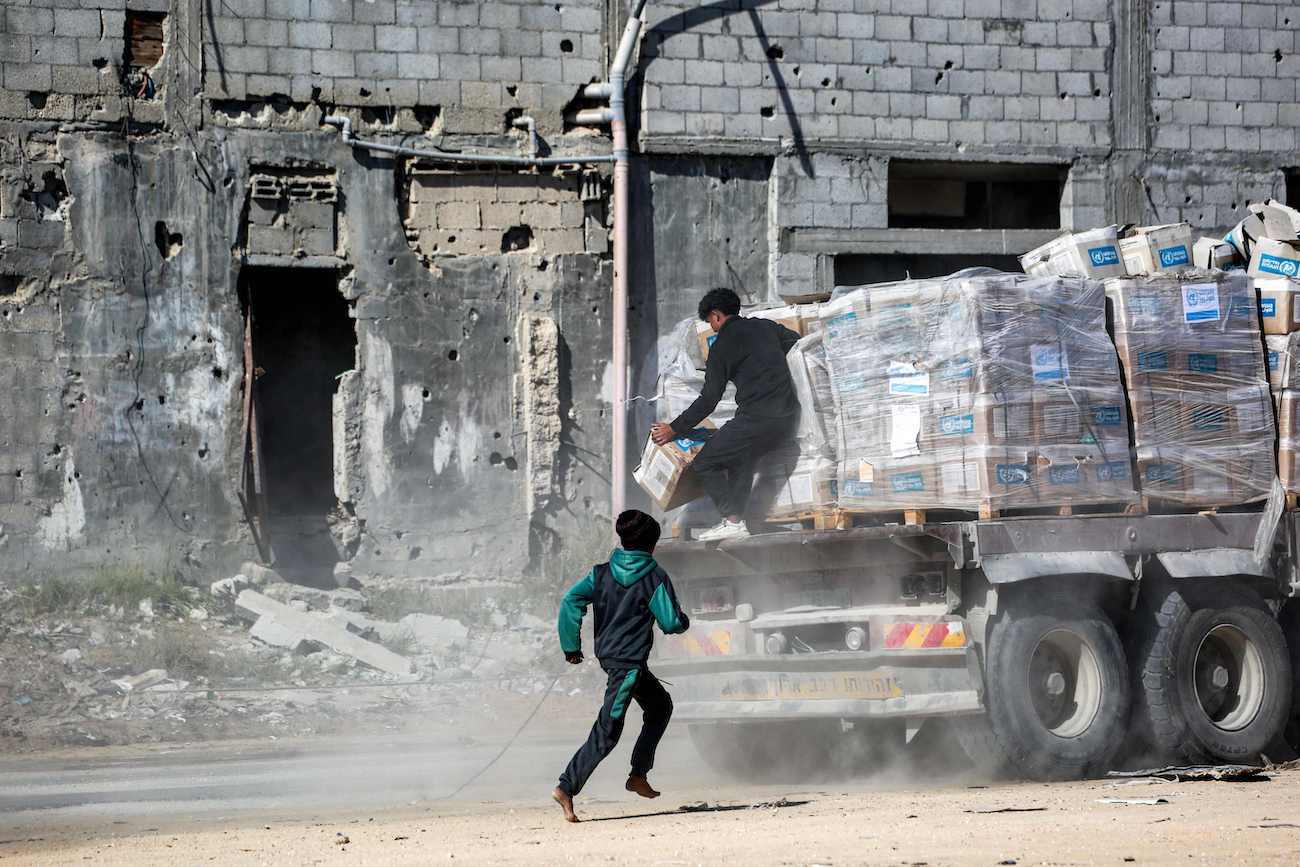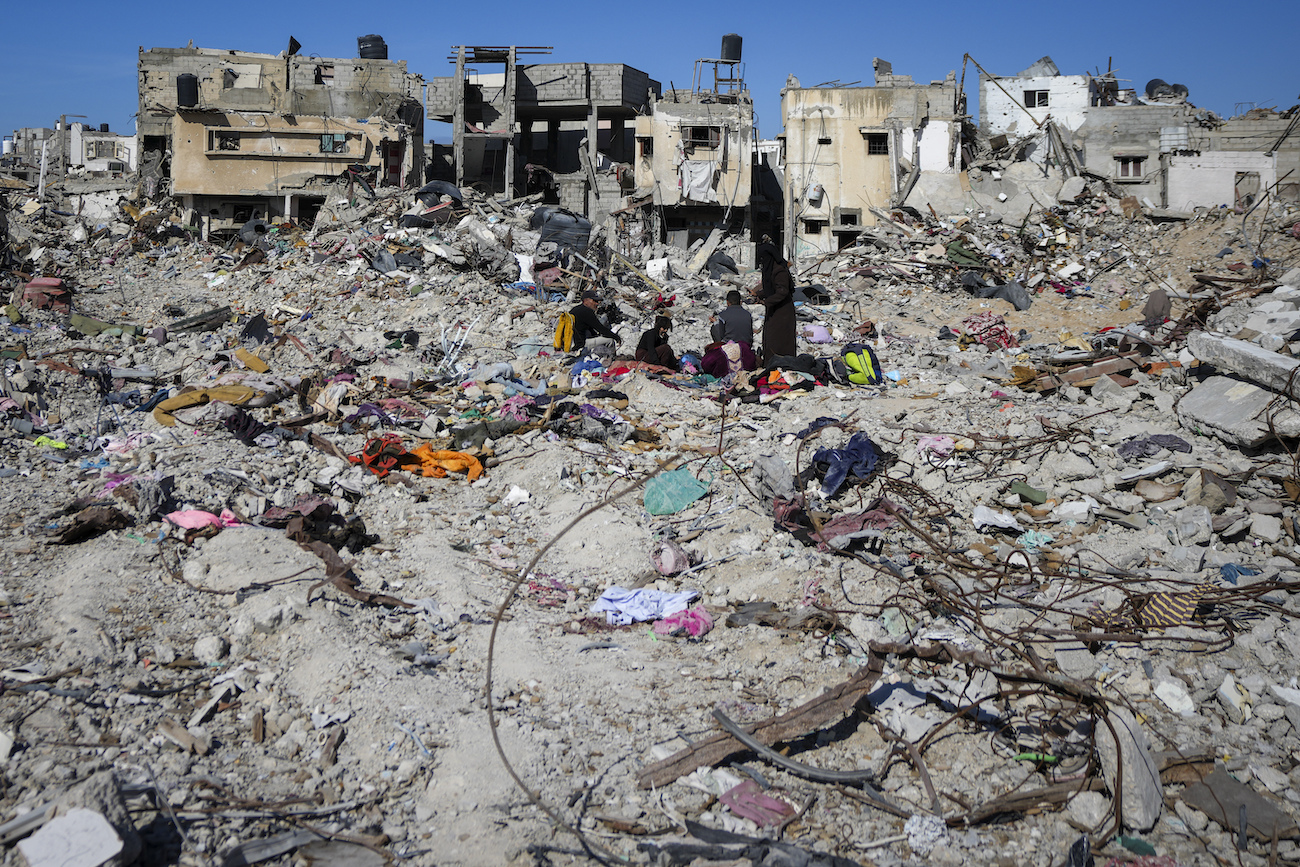ARAMOUN: Ayman Jaber’s memories are rooted in every corner of Mhaibib, the village in southern Lebanon he refers to as his “habibti,” the Arabic word for “beloved.” The root of the village’s name means “the lover” or “the beloved.”
Reminiscing about his childhood sweetheart, the 45-year-old avionics technician talks about how the young pair would meet in a courtyard near his uncle’s house.
“I used to wait for her there to see her,” Jaber recalls with a smile. “Half of the village knew about us.”
The fond memory contrasts sharply with recent images of his hometown.
Mhaibib, perched on a hill close to the Israeli border, was leveled by a series of explosions on Oct. 16. The Israeli army released a video showing blasts ripping through the village in the Marjayoun province, razing dozens of homes to dust.
The scene has been repeated in villages across southern Lebanon since Israel launched its invasion a month ago with the stated goal of pushing Hezbollah militants back from the border. On Oct. 26, massive explosions in and around Odaisseh sparked an earthquake alert in northern Israel.
Israel says it wants to destroy a massive network of Hezbollah tunnels in the border area. But for the people who have been displaced, the attacks are also destroying a lifetime of memories.
Mhaibib had endured sporadic targeting since Hezbollah and Israeli forces began exchanging fire on Oct. 8 last year.
Jaber was living in Aramoun, just south of Beirut, before the war, and the rest of his family evacuated from Mhaibib after the border skirmishes ignited. Some of them left their possessions behind and sought refuge in Syria. Jaber’s father and two sisters, Zeinab and Fatima, moved in with him.
In the living room of their temporary home, the siblings sip Arabic coffee while their father chain-smokes.
“My father breaks my heart. He is 70 years old, frail and has been waiting for over a year to return to Mhaibib,” Zeinab said. “He left his five cows there. He keeps asking, ‘Do you think they’re still alive?’”
Mhaibib was a close-knit rural village, with about 70 historic stone homes lining its narrow streets. Families grew tobacco, wheat, mulukhiyah (jute mallow) and olives, planting them each spring and waking before dawn in the summer to harvest the crops.
The village was also known for an ancient shrine dedicated to Benjamin, the son of Jacob, an important figure in Judaism. In Islam, he is known as the prophet Benjamin Bin Yaacoub, believed to be the 12th son of prophet Yaacoub and the brother of prophet Yousef.
The shrine was damaged in the 2006 war between Israel and Hezbollah, then renovated. Pictures show the shrine enclosed in a golden cage adorned with intricate Arabic inscriptions beside an old stone mosque crowned by a minaret that overlooked the village. The mosque and the shrine are now gone.
Hisham Younes, who runs the environmental organization Green Southerners, says generations of southerners admired Mhaibib for its one-or two-story stone homes, some built by Jaber’s grandfather and his friends.
“Detonating an entire village is a form of collective punishment and war crime. What do they gain from destroying shrines, churches and old homes?” Younes asks.
Abdelmoe’m Shucair, the mayor of neighboring Mays el Jabal, told the Associated Press that the last few dozen families living in Mhaibib fled before the Israeli destruction began, as had residents of surrounding villages.
Jaber’s sisters attended school in Mays Al-Jabal. That school was also destroyed in a series of massive explosions.
After finishing her studies in Beirut, Zeinab worked in a pharmacy in the neighboring village of Blida. That pharmacy, too, is gone after the Israeli military detonated part of that village. Israeli forces even bulldozed their village cemetery where generations of family members are buried.
“I don’t belong to any political group,” Zeinab says. “Why did my home, my life, have to be taken from me?”
She says she can’t bring herself to watch the video of her village’s destruction. “When my brother played it, I ran from the room.”
To process what’s happening, Fatima says she closes her eyes and takes herself back to Mhaibib. She sees the sun setting, vividly painting the sky stretching over their family gatherings on the upstairs patio, framed by their mother’s flowers.
The family painstakingly expanded their home over a decade.
“It took us 10 years to add just one room,” Fatima said. “First, my dad laid the flooring, then the walls, the roof and the glass windows. My mom sold a year’s worth of homemade preserves to furnish it.” She paused. “And it was gone in an instant.”
In the midst of war, Zeinab married quietly. Now she’s six months pregnant. She had hoped to be back in Mhaibib in time for the delivery.
Her brother was born when Mhaibib and other villages in southern Lebanon were under Israeli occupation. Jaber remembers traveling from Beirut to Mhaibib, passing through Israeli checkpoints and a final crossing before entering the village.
“There were security checks and interrogations. The process used to take a full or half a day,” he says. And inside the village, they always felt like they were “under surveillance.”
His family also fled the village during the war with Israel in 2006, and when they returned they found their homes vandalized but still standing. An uncle and a grandmother were among those killed in the 34-day conflict, but a loquat tree the matriarch had planted next to their home endured.
This time, there is no home to return to and even the loquat tree is gone.
Jaber worries Israel will again set up a permanent presence in southern Lebanon and that he won’t be able to reconstruct the home he built over the last six years for himself, his wife and their two sons.
“When this war ends, we’ll go back,” Ayman says quietly. “We’ll pitch tents if we have to and stay until we rebuild our houses.”
In Lebanon, a family’s memories are detonated along with their village
https://arab.news/6uxzm
In Lebanon, a family’s memories are detonated along with their village

- The scene has been repeated across southern Lebanon since Israel invaded with the aim of pushing Hezbollah militants back from the border






























